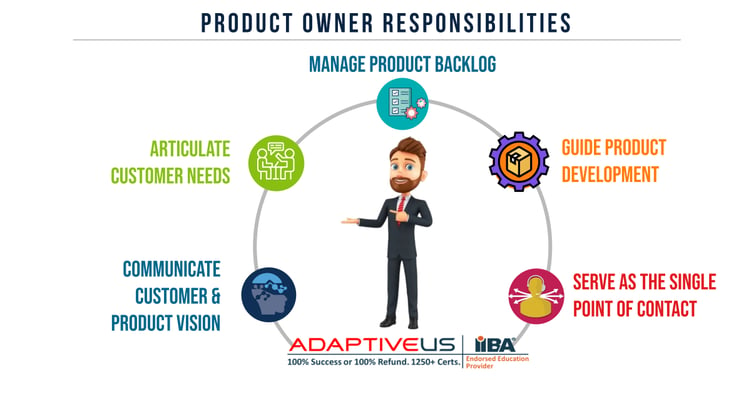What is a Product Owner? - Adaptive US
Over the last few decades, organizations have moved to an agile way of working. Among the agile frameworks, Scrum has become the most popular framework. It is estimated that more than 75% of software projects are executed using the Scrum Framework. The scrum framework has 3 distinct roles:
- Scrum team
- Scrum master and
- Product owner.
In this blog, we will explain the pivotal role played by the Product Owner toward the success of the project.
Product Owner Definition
The product owner is someone who manages and optimizes the product's value which is developed by the scrum team. This role can be different for individuals and across organizations & Scrum Teams.
Product Owners are a part of the scrum team. They act as the 'customer's advocate' and make the product's vision and goal clear to the team. Product Vision and Goal are the basis on which the work is derived and prioritized. The aim is to deliver value to internal or external stakeholders. A product owner identifies, measures, and maximizes value for the entirety of the lifecycle of a product.
Responsibilities of a Product Owner
Product Owners enable the stakeholders to articulate their needs, prioritize them, and deliver solutions that drive value. A Product Owner acts as a liaison between different areas of the organization. It offers an excellent opportunity to interact and collaborate with various stakeholders, develop innovative solutions, and improve existing solutions. Product Owners often work as a bridge between business stakeholders and the development team.
The Product Owner can be the sole contributor or can delegate the tasks to other scrum team members. However, irrespective of who performs the tasks, the product owner is the one accountable for the value and delivery of the task.
A Product Owner must earn the respect of the entire organization. They need the organization's support for the decisions they make. This is an essential requirement for a product owner's success. A product owner's decisions must be clear in the Product Backlog and via the Increment of work shared during Sprint Review.
It should be noted that the Product Owner is not a committee but an individual. In the Product Backlog, they are the representative of the stakeholders' needs. If a stakeholder requires a change in the Product Backlog, it needs to be discussed with the Product Owner. But ultimately, it is the Product Owner who is the decision maker. The Product Owner also gets feedback from customers about the product.
In short, the Product Owner's responsibilities can be categorized under the following 5 areas:

- Communicate Customer and Product Vision
The product owner should have clarity on the goals and objectives of the customer and product. This should be properly defined and conveyed to the relevant stakeholders like the customers, scrum master, development team, project team, and management team.
- Articulate Customer needs
The product owner should be able to predict and understand the customer's needs. This can be possible if the product owner has ample industry and market experience. In order to anticipate new requirements and changes better, the product owner should understand the customer needs from the perspective of the journey lifecycle.
- Manage Product Backlog
The PO is the owner of the Product Backlog. One of the main responsibilities of the Product Owner is effective Product Backlog management. This includes-
-
- Define and manage the product roadmap
- Develop and clearly communicate the Product Goals
- Create and clearly communicate the Product Backlog items
- Ordering and prioritizing the Product Backlog items
- Ensuring that the Product Backlog is transparent, evident, and understood
- Ensuring that the development path is charted out properly
Owing to the dynamic and ever-changing nature of the product backlog, the stakeholders should have access to the product backlog.
- Guide Product Development
The PO should actively guide the scrum team in implementing the product's vision and roadmap. As and when there is a change in the customer's requirements and vision, the change needs to be conveyed to the development team. All meetings, reviews, and cadence regarding the product should include the product owner. The PO should initiate and participate in the sprint review discussions and point out the areas of improvement.
- Serve as the Single Point of Contact
The product owner should be the single point of contact point for the various stakeholders. The PO is the liaison between the customers, management, and development teams and ensures that they all have the proper buy-in. The product's delivery and the project's smooth execution are dependent on this.
Product Owner Qualifications
Product Owners understand the goals of a product, analyze requirements, devise product roadmap, and collaborate with stakeholders. To become a successful product owner, a good understanding of technology, a comprehensive understanding of businesses, and specific knowledge of product development processes are essential.
When it comes to Product Owner qualification, typically, a bachelor's degree in computer engineering, computer science, or any other related field is required. In addition, it will be useful to have working knowledge or training in product management.
Typically someone aiming for a product owner's role should have the following qualifications-
- Good understanding of Scrum and Agile Software Development Methodology
- Working knowledge of product development architecture
- Proficiency in the use of analytic tools
- Excellent knowledge of user-centered design principles
- Understanding of design quality standards
Product owners usually start their careers in entry-level roles that use Agile methodology, for example, as a Software Tester.
Along with a degree and experience, additional certifications add to employability as a product owner. Certifications help in gaining knowledge, and they help widen market opportunities. Courses like the Professional Scrum Product Owner (PSPO), IIBA-CPOA, Certified SAFe Product Owner, etc., will be a definite plus.
Product Owner Skills
A successful product owner should have the following skills-
- Analytical skills
- Communication skills
- Collaboration skills
- Technical skills
- Project management skills
Product Owner Salary
Factors like qualification, experience level, location, type of work contract (part-time or full-time), etc., determine the salary of a Product Owner. For example, the average salary of a Product Owner in Asian regions is not at par with the average salary in North America. The salary compensation also depends on the company the Product Owner is working for. On average, a Product Owner in the US earns $108,747 per year(data taken from indeed.com).
Product Owner Certifications
CSPO from Scrum Alliance
The Scrum Alliance product owner certification is the most recognized in the industry. In addition, every Scrum Alliance certification comes with membership in Scrum Alliance, so you can actively grow your skills and your agile career far beyond the classroom.
Whatever your goal, as a member of the Scrum Alliance community, you have access to the help you need. Sometimes that looks like earning a more advanced certification. Other times that help looks like a proprietary product owner improvement tool, members-only access to experts at events, practical how-to and content reserved just for active Certified Scrum Product Owners like you, and much more.
CPOA from IIBA
The Certificate in Product Ownership Analysis (CPOA) from IIBA recognizes the combination of Product Ownership, Business Analysis, and an Agile mentality to maximize value. CPOA allows professionals to learn key concepts to create successful products. Product Ownership Analysis (POA) involves applying specific procedures and developing important competencies, giving the framework, tools, techniques, approaches, and basic Agile values to Product Owners, Proxy Product Owners, and team members.
The CPOA certificate helps in learning the key principles of product management and helps overcome hurdles while designing successful products. It provides tactical skills to improve the process of product development aided by the knowledge of tools and methodologies.
Product Owner Training
Many organizations provide Product Owner training using the self-paced mode, virtual learning mode, or in-person sessions. Adaptive US provides Product Ownership training in all the modes mentioned above.
Learn more about Adaptive CPOA Training.
If you have questions about the Product Owner role, do comment below.
You May Also Like
These Related Stories

A Guide to Product Ownership Certifications: CSPO, PSPO, and CPOA

Business Analyst Manager: Responsibilities, Skills and Certifications


Comments (3)